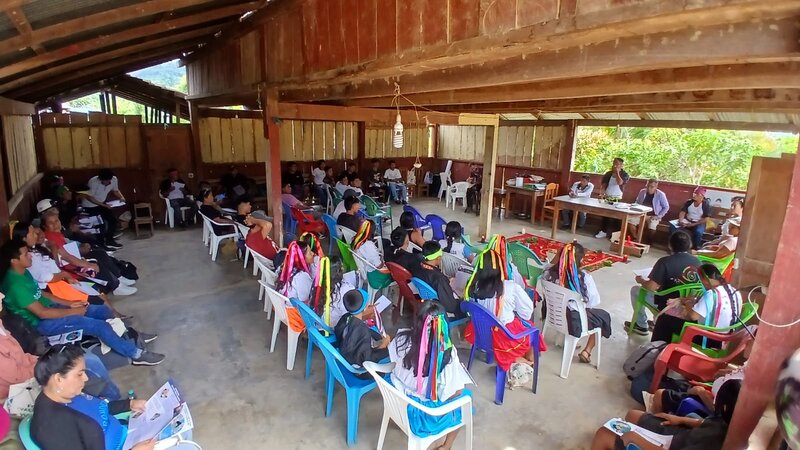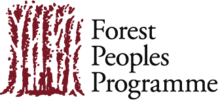
Yachaykuna Yuyay Wasi (School for learning to think): The Kichwa community of San Martín prepares its youth for future leadership roles

Kichwa organisations from the San Martín region, CEPKA, FEPIKBHSAM and FEPIKECHA, gathered in the Kichwa Native Community of Mushuk Belén to hold the first Yachaykuna Yuyay Wasi School (learning to think) to strengthen their future community and federation leadership. In fulfilling agreements and consensus as a people, the Kichwa are strengthening themselves and moving towards self-government of their destinies.
San Martín. - From 24 to 26 October this year, in the native Kichwa community of Mushuk Belén, approximately 40 Kichwa youth from the base communities of the Ethnic Council of the Kichwa Peoples of Amazonia (CEPKA), the Federation of Indigenous Kichwa Peoples of Chazuta, Amazonia (FEPIKECHA), and the Federation of Indigenous Kichwa Peoples of Bajo Huallaga San Martin (FEPIKBHSAM), gathered for the first edition of the Yachaykuna Yuyay Wasi School (learning to think).
The School, led by the Kichwa organisations themselves, arose from a self-identified need to prepare young people who will one day occupy political leadership positions in their communities and federations. Thus, these young people, strongly identified and committed to their communities and organisations, along with their issues and their initiatives, have started to prepare themselves to lead them on the path towards self-government of their own futures.
Yachaykuna Yuyay Wasi was based on three fundamental pillars: territory, rights and cultural identity.
During the School, there were profound reflections on what community leadership should look like today, as well as an intergenerational dialogue with leaders who have long technical and political experience in defending Kichwa territories and livelihoods.

Kichwa youth also reflected on the scope of Indigenous Peoples' rights at the national and international levels, such as free, prior and informed consultation and consent; territory, the right to autonomy and self-determination, Indigenous justice, and the political role and rights of Indigenous women.
“I feel happy and very empowered, because this School is very helpful in strengthening our knowledge and exchanging ideas and problems that other communities have had. This helps us because, if we have had the same problem, we can solve it by learning from each other. We also have a lot of dialogue among ourselves. We are happy to get to know each other because perhaps in the future, if I am an authority in my community, and they are too, in an assembly or meeting, there will be greater fluidity of participation, we will know each other and have more confidence. I feel empowered because we have talked about territory, identity, our rights, and I am learning from a very young age. This type of school would have been very important for our previous leaders, so we are grateful for the trust placed in us," Jacob Yaicurima Cenepo, Atumpampa - FEPIKECHA
The School also addressed ways of engaging with State authorities, such as in technical and political negotiations, among others. Practical knowledge was shared on how to draw up community agreements in a context where there are serious threats to Indigenous territories and where judges and police are absent. Strategies that Kichwa organisations have been implementing for territorial recovery and effective control of their territories were also reviewed.

The transmission of Kichwa knowledge to reinforce Kichwa identity and pride also formed part of the training of participants, with workshops on the Kichwa language, traditional weaving, and the healing power of medicinal plants.
“I am happy and proud to be participating in this youth event, which will help us become better leaders in the future. We are leaving here happy to return to our communities and share this vision for the future. We are eagerly awaiting the next School, which is coming soon, and the support of our current leaders,” Sandy Guerra Amasifuen, Winkuyacu– CEPKA
The School, which is supported by IDL and FPP, brought 2025 to a close with the promise of meeting again for a second edition in 2026 in Bajo Huallaga.
"I am very happy because I have come on behalf of my federation to represent my people. I really enjoyed learning about our rights as an Indigenous People, and that we all have rights, both men and women. It is an important reflection for young people and motivates others to come and learn, without fear and without nerves. Thank you to the Mushuk Belen community," Mauro Zumba Pilco, Callanayaku – FEPIKBHSAM
Overview
- Resource Type:
- News
- Publication date:
- 5 November 2025
- Region:
- Peru
- Partners:
- Federación de Pueblos Indígenas Kechwas del Bajo Huallaga San Martín (FEPIKBHSAM) Federación de Pueblos Indígenas Kechua Chazuta Amazonas (FEPIKECHA) Consejo Étnico de los Pueblos Kichwa de la Amazonia (CEPKA)
